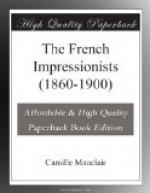[Illustration: CLAUDE MONET
THE PINES]
Manet and his friends drew all their strength from this idea. Much finer and more learned than a man like Courbet, they saw an aspect of modernity far more complex, and less limited to immediate and grossly superficial realism. Nor must it be forgotten that they were contemporaries of the realistic, anti-romantic literary movement, a movement which gave them nothing but friends. Flaubert and the Goncourts proved that Realism is not the enemy of refined form and of delicate psychology. The influence of these ideas created first of all Manet and his friends: the technical evolution (of which we have traced the chief traits) came only much later to oppose itself to their conceptions. Impressionism can therefore be defined as a revolution of pictorial technique together with an attempt at expressing modernity. The reaction against Symbolism and Romanticism happened to coincide with the reaction against muddy technique.
The Impressionists, whilst occupying themselves with cleansing the palette of the bitumen of which the Academy made exaggerated use, whilst also observing nature with a greater love of light, made it their object to escape in the representation of human beings the laws of beauty, such as were taught by the School. And on this point one might apply to them all that one knows of the ideas of the Goncourts and Flaubert, and later of Zola, in the domain of the novel. They were moved by the same ideas; to speak of the one group is to speak of the other. The longing for truth, the horror of emphasis and of false idealism which paralysed the novelist as well as the painter, led the Impressionists to substitute for beauty a novel notion, that of character. To search for, and to express, the true character of a being or of a site, seemed to them more significant, more moving, than to search for an exclusive beauty, based upon rules, and inspired by the Greco-Latin ideal. Like the Flemings, the Germans, the Spaniards, and in opposition to the Italians whose influence had conquered all the European academies, the French Realist-Impressionists, relying upon the qualities of lightness, sincerity and expressive clearness which are the real merits of their race, detached themselves from the oppressive and narrow preoccupation with the beautiful and with all the metaphysics and abstractions following in its train.




